Ashley Chatmon - Flagler College BSU President "Never Underestimate the Learning You Can Obtain Outside of School"
On Martin Luther King, Jr. Day, a young female voice rang loud and clear at the Plaza de la Constitución in downtown St. Augustine, and the audience, participants in the annual MLK Day Silent March in St. Augustine, applauded her message, which resonated across color lines and across all age groups.
"As a student, and especially as a high school student, you may feel helpless. While adults argue about preserving your physical safety at school, they're also coming for what you're allowed to learn, whose history is worth learning, whose feelings must be protected. Your books are being banned, your plays are being canceled. Well, I'm here to tell you to never underestimate the learning you can obtain outside of school. I implore you to get in touch with your community leaders. I implore you to know your history. The public library is free. Take your education into your own hands, because no one can take that away from you."
Ashley Chatmon, Black Student Union President at Flagler College
Video courtesy of Kelsey Kolisnyk
Listen to Chatmon's powerful speech and introduction of her fellow BSU member Spencer Hooker, and make sure to share the message with anyone you think it would benefit.
Chatmon's powerful voice and her dedication to the work of the Black Student Union at Flagler College as well as to the community involvement in St. Augustine deserve a special feature, as her leadership should inspire all of us to take action and stand up for what we believe in. Chatmon, a junior at Flagler College, is the recipient of the Thinkers and Leaders for a Better Tomorrow Scholarship, she volunteers at RESET St. Augustine, and she is currently a digital communication intern at the Lincolnville Museum and Cultural Center.
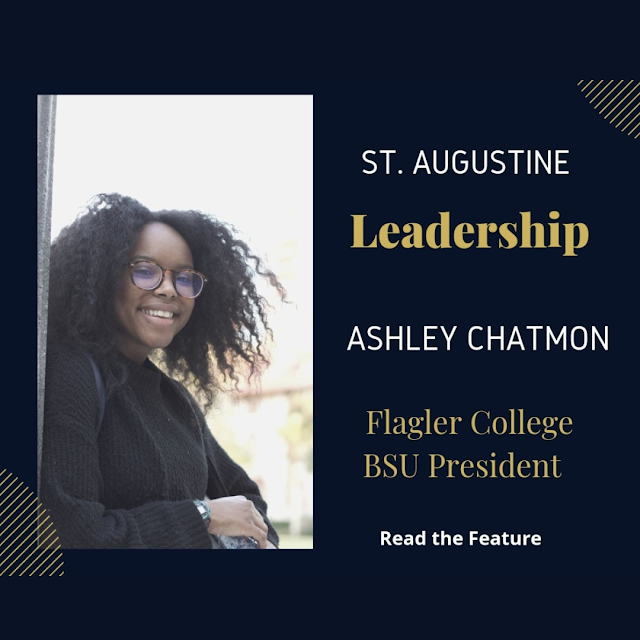 |
| Ashley Chatmon, Black Student Union President, Flagler College Photographer: Spencer Hooker |
St. Augustine Leadership Feature:
Name and age: Ashley Chatmon, 21
College major and year of college: Junior/3rd year at Flagler College in St. Augustine, FL.
Digital Media Production and Journalism with minors in Media Studies and Film Studies
Social media account links, etc.: @flaglerbsu, www.linkedin.com/in/ash-chatmon
Hometown: Jacksonville, FL
High school: Douglas Anderson School of the Arts
Your powerful speech at the MLK Silent March has resonated with a lot of local residents. You encourage students to educate themselves outside of school, why is this important, and how has doing so changed who you are?
I am a very curious person that loves to investigate, loves to read, and loves to learn. I always have been, largely because my parents are both lifelong educators. My mother taught me to read before I entered school, and it was my favorite thing to do. I also grew up attending a church where it was encouraged to study on your own, ask questions, and seek understanding even if it means going all the way to the Greek or Hebrew text.
Black history is rarely, if ever, included in a child’s education. When it is, it is filled with generalizations and half-truths. There are a lot of stories and people who are minimalized or erased from common history. I understand that you can’t teach little ones everything about everyone, there are only so many hours in a day. But when you look at who and what is cut out, there is a clear pattern. Those who do not exemplify and uphold the hegemonic powers that be fall to the cutting room floor.
I believe that your education and your aptitude for empathy and critical thinking are incomplete if you do not take the initiative to inform yourself outside of your formal education. This has always been true to me. I feel that this is even more pertinent now as blatant, targeted, censorship in public schools continues to rise. That’s an easy excuse to explain why you’re ignorant, but it’s not a good one. The governor's office may deem your history not worthy of learning, but that doesn’t mean you have to take that to heart. Every life has value, every culture has value. You can go to the library or visit databases etc. online and learn exactly what “you’re not supposed to”.
This process of seeking out answers and following rabbit trails to learn more about the people, cultures, and history that make up the world as we know it today helps me to have a more empathetic view of others, a greater self-worth, and a greater ability to identify dog whistles when I see them. On one hand, it’s changed me because it guards me against internalizing the anti-black messages built into so much of our lives, and empowers me to help other people see how worthy and capable they are of dignity and joy. On the other hand, it hasn’t changed me because it is an endless process of shaping and reshaping my worldview to allow as many people to be respectfully included as I can. That’s the fun of it though.
You talk about honoring Dr. King by service to others. Please explain.
MLK and MLK Day as a whole has really been reduced to a feel-good, pat on the back, day where we just say “love everyone!” and then we go home. This is why I loved this year's theme honing in Dr. King's words, “vigorous and positive action”. His message was not just “don’t judge”. His message was to fight for the poor, the needy, protect and preserve the God-given dignity of your neighbors. We tend to leave out those parts because they require action. Sentiment doesn’t improve communities. Volunteers, organizers, and money does.
Please tell the local community about the Black Student Union at Flagler College. How has BSU been involved in past projects, and are there any current community projects underway?
The purpose of the Black Student Union is to give students who are Black a voice on a predominately White campus. The Black Student Union provides a safe space for students to express themselves. I think BSU’s main contribution to the community is volunteering. We’re college students, there’s always at least one person with the time. Right now we’re aiming to help out with a mural for the Corner Market in Lincolnville, our lovely event coordinator has really put a lot of time into a monthly market for small black-owned businesses called the Melanin Monday Markets (we do these once a month!), we’ve got a black history month packed with events, and something I am hoping to put together this year is a Social Action Conference that invites some community leaders and diversity, equity, and inclusion professionals to Flagler so that I can hopefully inspire students and community members to get out there and make some change.
The BSU at Flagler College is very active in the St. Augustine community. Why do you think that is, and what is your vision for this continuing relationship?
My goal is to reallocate Flagler’s time and resources, even if that’s just students' elbow grease, into the community we take up so much space in. When I came into BSU as president I discussed core goals and values with the board. We agreed on Educating ourselves and others, social/destress opportunities for Black students, and community involvement.
What inspired you to become a part of the BSU?
I was the only Black person and sometimes the only person of color in all my classes and that was reflected through the content, discussions, and cultural literacy I interacted with. That’s not necessarily negative, but it was definitely draining to constantly be misunderstood or have to explain myself or point out that the discussions that were being had were missing a vital point of view. BSU was a place where I wasn’t othered.
Have you always aspired to become a leader, or did it just kind of happen?
Leadership tends to be something that just happens to me. If I see something that needs to be done, I try to assemble a team to do it. I think I have a skill for finding out people’s strengths and organizing so that people can use those strengths for a common goal. The previous BSU president reached out to me about joining the board, and I just found myself taking more responsibility as I saw where there were needs.
What would you say to students, high school students, middle school students, and college students, who have ideas, but don't know how to start? They want to lead, but they don't know how to get involved in leadership.
I say read up on what leaders are in your field. See what they did and apply what you learned to your own situation. Contact people even if they seem like they may not respond. Most good leaders are eager to give guidance to the upcoming generation. What is most important is to pay attention to the needs around you, and work towards practical steps to fill them. Action with a few mistakes or failings is more valuable than no action at all. Seek to grow your knowledge, then get out there and do the best you can with the knowledge you have!
In your work with BSU, you have surely come across local community leaders and civil rights activists from the past and the present. How have these experiences helped shape you as a person, as a writer, and as a leader?
They inspire me to stay diligent. I’ve met people in this community who spent time with MLK. That’s recent history. That's not past tense or done and settled. We’re still in this.
What has been the most important thing for you about joining BSU? Do you want to tell me a little bit about your fellow club leaders, and how they help you become a better leader?
My club leaders are passionate, unselfish, and kind. They are the type of people who would lend you the clothes off their backs. We all have the confidence to press forward in our efforts as a team because there is a spirit of openness, kindness, and familial love between us. We all want to see each other thrive, as a team, and as a universal black community. We work hard because we want to take care of our community.
Do you have any stories from your family or ancestors, which impact the way you think about racial inequality or leadership?
I have a family member who was lynched, and that’s one of the things that reminds me to never sanitize the horrors that Black people have faced in this country.
Did you ever have an aha moment at the college, where you felt, this is it, I belong here?
I continually feel that I do not belong at Flagler College, but the BSU and the St. Augustine community leaders like Gayle Phillips, Laverne March, David Williamson, and many more remind me that it's important to commit to creating belonging and respect for others, and the help of people like me can make that possible.
How did your high school prepare you for college and for leadership?
I went to Douglas Anderson School of the Arts for creative writing, which taught me about collaborating with others. A huge takeaway is it helped me to listen to other people, how to respond to big emotions in myself and others. It grew my capacity for empathy and shrunk my interest in maintaining status quo.
How is Flagler College preparing you to get out into this world and continue to be a leader and activist after graduation?
It is really preparing me to not be imitated or discouraged by bureaucracy. I had to do 17 pages of paperwork to request a table and chairs for a guest speaker, not to mention the papers that had to be filled out to even be allowed to host the event. The civil rights marker was deferred and denied for three years. When we finally got to it, they tried to get us to change the unveiling date so they could do a petting zoo on campus, despite the fact that we had already invited community members to the event. Almost every event we do requires constant follow-up and procedural nonsense to go through. I think my Flagler experience has shown me the importance of fighting through the paperwork and deferment and showing up in faces and offices, and refusing to accept unacceptable conditions.
As a young, black woman, what do you want to tell me, a white woman? What should I know about the experience of being a young black woman growing up in 2023? How can white people reach over in a way that is not offensive, and which will be welcome?
I think taking the time to educate yourself rather than putting that burden on the black people in your life. There are a lot of resources out there, especially after 2020. Read those big hits like White Fragility, How to be Anti-Racist, 1619 Project. Even earlier things like writings from Angela Davis, Bell Hooks, Huey P.Newton. Consume Black art and writing, know history, and seek out opportunities to grow in cultural literacy. Go to people in your community who are working towards unity and ask how to help. I think what’s most important is knowing that black womanhood and white womanhood are not the same, but we can still be allies in creating a better world.
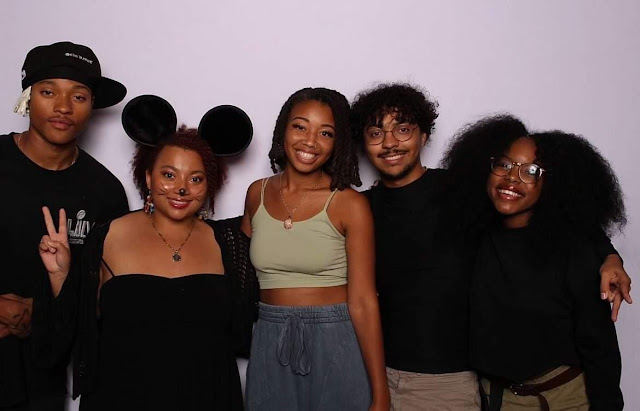 |
| Flagler College Black Student Union - Marcus Crain, Zariah Anglin, Katera Frazier, Spencer Hooker, and Ashley Chatmon at a BSU event. |
You can follow the Flagler College Black Student Union on Instagram to learn more and to stay up to date on all of their events at Flagler College and in the St. Augustine community.
***
As Black History Month is coming to an end, we should all remember that black history is American history and that we need to educate ourselves and our children about the past to understand the present and prevent the mistakes of the past from repeating themselves in the future.
*This piece was originally posted on the West Augustine News Connection on February 28, 2022.
Please sign up for the St. Augustine Connection newsletter and follow us on Facebook, Instagram, TikTok, and YouTube to help us spread the word about the work we do so that we can help serve you better. You can also join the St. Augustine Connection News & Events group on Facebook where you can share your own St. Johns County and St. Augustine news and events.
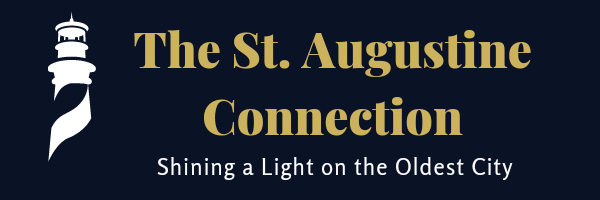
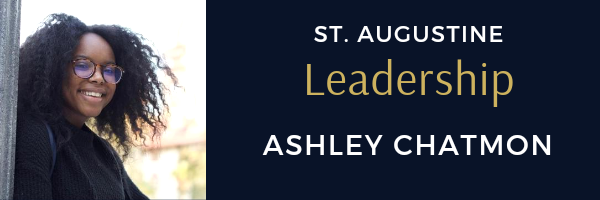
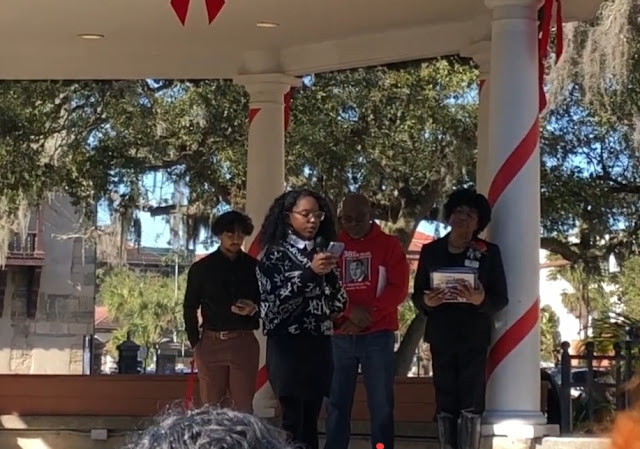
Comments
Post a Comment